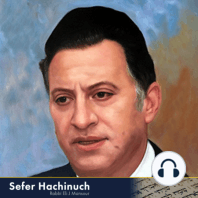20 min listen
Misva #26: Believing in Other Deities
FromSefer Hachinuch
ratings:
Length:
20 minutes
Released:
Aug 31, 2021
Format:
Podcast episode
Description
The second of the Ten Commandments is the prohibition, “Lo Yiheyeh Lecha Elohim Aherim Al Panai” – “You shall not have other gods besides Me.” This command forbids believing in a force that is independent of Hashem. A separate prohibition forbids actively serving other deities; this command forbids even the thought that some person, thing, or force can act independently of G-d. Even if a person believes that G-d created everything in the universe, he violates this prohibition if he attributes to anything divine power, regarding it as capable of acting outside G-d’s control and authority. Needless to say, this prohibition is binding upon both men and women, at all times. It is also binding upon gentiles, as idolatrous beliefs are included among the Seven Noachide Laws which apply to all people, both Jew and gentile. As this prohibition is not violated through an action, Bet Din does not punish one who transgresses this command. However, violators are liable to “Mita Bi’ydeh Shamayim” – death at the hand of G-d. At first glance, it might seem that this command is not so relevant to us today, when the civilized world has, by and large, renounced paganism, and we are not influenced by pagan beliefs as our ancestors were. In truth, however, the Poskim address potential contemporary violations of this command, specifically, when people try to invoke other forces to have their wishes granted. This issue has been discussed in the context of the widespread practice to pray at the gravesites of Sadikim. Of course, this practice is well documented in Torah sources. It dates back to Kaleb Ben Yefuneh, one of the twelve spies, who went to pray at the graves of our patriarchs and matriarchs in Hevron, begging for assistance in resisting the pressure of the other spies, who conspired to convince Beneh Yisrael not to enter the land. Clearly, praying to G-d at a righteous person’s gravesite is permissible and something very valuable. Nevertheless, when praying at the grave of a Sadik, one must ensure not to pray to the Sadik himself and ask him to provide what he needs. As great as the Sadikim are, they are human beings and do not have any divine powers. One who prays to the Sadik with the belief that the Sadik has the power to grant him his wishes is in violation of the command of “Lo Yiheyeh Lecha Elohim Aherim Al Panai.” The Rabbis give different explanations for the practice of praying at the graves of the Sadikim. The Maharil (Rav Yaakov Moelin, Germany, d. 1427) writes that the burial site of a Sadik has sanctity, and this sanctity makes the prayers recited there more readily accepted. Another approach, mentioned by the Lebush (Rav Mordechai Yoffe, 1530-1612), in Siman 579, is that the merit of the Sadik uplifts the prayers recited at the gravesite, making them more effective. The Ran (Rabbenu Nissom of Gerona, Spain, 1320-1380), in one of his published Derashot (8), explains that the Shefa (heavenly bounty of goodness) comes into the world from the heavens via the righteous Sadikim – even those who have already passed away. Therefore, when we visit a Sadik, we access the “pipeline” through which blessing comes into the world. Others explain that when we go to the gravesite of a Sadik and speak about our troubles and hardships, the soul of the Sadik experiences pain, hearing of the difficulties faced by fellow Jews. Hashem therefore intervenes and removes the hardship for the sake of the Sadik, to alleviate his anguish. The Maharal of Prague (Rav Yehuda Loew, 1520-1609) offers a much different explanation. He writes that the Jewish People constitute a single entity, like one human body, with different members of the nation functioning as different organs of the body. The righteous, of course, function as the “brain” of the nation. Therefore, when we pray at the grave of a Sadik, we are simply motivating ourselves to pray. Since the Sadik is part of the same entity, this is like we are speaking to our arms or our legs to work harder. This
Released:
Aug 31, 2021
Format:
Podcast episode
Titles in the series (100)
Misva #21: Telling the Story of the Exodus on the Night of the 15th of Nissan: Daily Sefer Hachinuch - Brought to you by itorah.com by Sefer Hachinuch
